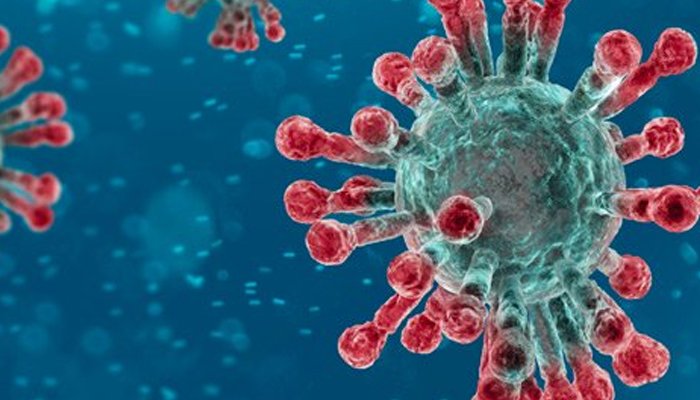Here is what medical experts have to say about six important questions regarding the coronavirus
World health officials had earlier this month declared the outbreak of the virus a global health emergency
March 21, 2020

The coronavirus, which surfaced in a Chinese seafood and poultry market late last year, has now spread to more than 185 countries, killing more than 11,000 and sickening hundreds of thousands of people in a matter of weeks. World health officials have declared the outbreak of the virus, which began in the city of Wuhan, a global health emergency.
The number of confirmed cases in Pakistan rose to 531 on Saturday after Sindh and Balochistan reported more cases. Sindh is the worst-affected province in the outbreak so far, although cases in Balochistan have been been steadily rising as well.
As the virus spreads, here are six important unanswered questions about the novel coronavirus, according to Vox.
1) How does the coronavirus spread?
“The best explanation for this rapid spread is that the virus is being passed through droplets from coughing or sneezing,” explains Julia Belluz at Vox. “When these virus-laden droplets from an infected person reach the nose, eyes, or mouth of another, they can transmit the disease.”
However, researchers are still puzzled as to how significant other modes of transmission are in spreading the disease, the publication reports. One possibility is that the virus can spread through feces. and although some experts say the new coronavirus isn’t airborne, that’s based on a narrow scientific definition of the term, the publication notes.
The virus can possibly still linger in the air for some time and under some conditions. As the journal Stat reports, scientists don’t yet know precisely what those conditions are. “The studies suggesting that [the virus] can be aerosolized are only preliminary, and other research contradicts it,” Stat reports.
So all three transmission routes — droplets, airborne, and fecal — are still possible contributors to the spread of the virus. “Almost certainly, one of these is probably the predominant one, and the others might be minor modes of transmission, but we don’t really understand this,” Hotez says.
2) Can people become reinfected?
There are some reports of people in China and Japan testing positive after recovering from the infection. Though, to be clear, it’s unknown whether those people were truly reinfected or still just had low levels of the virus in their systems after they felt better, Vox notes.
“I would say that the biggest unknown is how potent is the immune response generated in an infected person,” Akiko Iwasaki, an immunobiologist at the Yale School of Medicine, writes. “How long would [immune] protection last? ... The answers to these questions are key to understanding whether herd immunity is effective.“
Herd immunity is when enough people have contracted the virus and become immune that its spread can be slowed and potentially stopped. If reinfection is possible, however, herd immunity may not be an option. (Also, stopping the virus via herd immunity is not an ideal scenario. It would first mean millions upon millions of infections and potentially millions of deaths.)
For coronaviruses that cause the common cold (in the same family of viruses as the one that causes Covid-19), an expert says, reinfection is possible, but on a timescale of years, not weeks or months. Again, we’re going to have to wait and see if this also applies to Covid-19.
3) How deadly is the coronavirus?
Right now, it’s looking like some countries have higher death rates for Covid-19 than others. These rates also keep changing. Now, the estimated death rate for Wuhan, China — the city where the outbreak began — is 1.4%, per a new study in Nature Medicine.
South Korea, on the other hand, was estimated to have a death rate of less than 1%. Italy’s seems to be, for now, higher. Are these estimates different because the citizens of these countries are at different levels of risk for some yet-to-be-determined variables? Are their caregivers better at treating the virus?
It does seem clear that older people — particularly those older than 80 — and those with chronic medical conditions are in the riskiest group for dying of Covid-19. But more knowledge is needed on other subgroups to better protect them.
4) Is it seasonal?
For a variety of reasons, some viruses — but not all — become less transmissible as temperatures and humidity rise in the summer months. The viruses themselves may not live as long on surfaces in these conditions. The droplets that transmit the virus also may not spread as far in humid air.
Mauricio Santillana, the director of the Machine Intelligence Lab at Boston Children’s Hospital, has been studying the potential seasonality of Covid-19 by looking at the best available data from China.
Before China instituted massive lockdowns, “we saw a signature that places that were colder and drier showed slightly larger transmissions before interventions,” Santillana says. Though he admits the data is limited, and it’s hard to analyze the exact impact temperature and humidity have on transmission.
That said, it’s not futile to keep studying seasonality effects. “This virus may be with us for the coming years,” Santillana says. Predicting spikes based on weather, however small, will give us “a more precise way to deploy resources around the world.”
5) What role do children play in spreading the virus?
“When there’s an influenza epidemic, kids are often some of the biggest community spreaders,” an expert explains. But with Covid-19, kids generally don’t seem to be getting severely ill. Which is leading researchers to ask: Are kids a big source of transmission of this virus?
“When we’re talking about closing schools, we’re doing that under the assumption that kids are significant community transmitters,” an expert says. “If we knew that one way or another, we could make a more informed decision.”
“We do know that children tend to have more mild infection, have more mild disease, but we have seen [at least one child] die from this infection,” Maria Van Kerkhove, the Covid-19 technical lead at the World Health Organization, said in a press conference on March 16.
While kids usually seem to be spared the worst, so many questions remain, as Umair Irfan at Vox explains: “A small percentage of younger people, from babies to young adults, have also suffered serious harm,” he writes. “Few children are being tested for the virus, so there still isn’t much good information about how many children are getting infected overall. And from there, it’s hard to gauge the rate of severe illness for the young.”
6) When will it end?
Could a pharmaceutical treatment emerge that will prevent people from dying from Covid-19? (Many drugs, including HIV-fighting antivirals, and common, cheap ones — like those to ward off malaria — are being tested right now, or may be tested soon.
“I think this idea … that if you close schools and shut restaurants for a couple of weeks, you solve the problem and get back to normal life — that’s not what’s going to happen,” says Adam Kucharski, an epidemiologist at the London School of Hygiene & Tropical Medicine and author of The Rules of Contagion, a book on how outbreaks spread.
“The main message that isn’t getting across to a lot of people is just how long we might be in this for.” But given that scientists have only known about this virus for a few short months, “it’s actually quite remarkable how much we’ve learned,” an expert says.
Originally published in Vox









